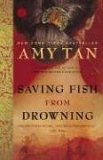Book Club Discussion Questions
In a book club? Subscribe to our Book Club Newsletter and get our best book club books of 2025!
For supplemental discussion material see our Beyond the Book article, and our BookBrowse Review of Saving Fish From Drowning.
Please be aware that this discussion guide will contain spoilers!
- In the opening chapter, Bibi says, "...in all my life no one had
loved me wholly and desperately." Discuss how this is reflected in Bibi's
voice and in the way she narrates Saving Fish from Drowning.
- As the opening epigraph, Tan has chosen a quote from Albert Camus that
reads, "Evil ...almost always comes of ignorance, and good intentions
may do as much harm as malevolence if they lack understanding." How
does evil, ignorance, and good intentions play out in the novel?
Discuss whether you have observed this in your own experiences with others.
- The role of the media, including the Global News Network and the reality
show "Darwin's Fittest" shapes outcomes and people's sympathies
in the story. Do you believe the media really does have such an
effect, and if so, in what ways and to what degree? Do you feel the
media should have more or less of an effect?
- Some of the group have mixed feelings about visiting Burma. "...it's in
some ways a financial collusion with a corrupt regime," Roxanne says.
(page 35). In a meeting with foreign journalists in Rangoon on November 17,
1995, the Nobel Peace Prize recipient Aung San Suu Kyi, when asked if she
thought tourism could help her country, reportedly replied, "Well, I
think that visitors to the country can be useful, depending on what they do,
or how they go about it. But I think also, tourists have to be careful not to
deceive themselves ...You can talk about 'trickle down' effect, but sometimes
the trickle down effect is exactly that, a mere trickle, which dissipates
before it gets to where it's required." Do you think it's better to
boycott a place where the native people are oppressed? Does tourism help in
these places, or does it hurt? What further information might you
need if you were one of the tourists considering whether to go to Burma?
- In Chapter 6 (page 161), the group's Burmese tour guide, Walter, says,
"...being American has less to do with one's proficiency in English and
more with the assumptions you hold dear and true - your inalienable rights,
your pursuit of happiness." Do you agree? How do you think Americans are
perceived overseas today? What other qualities define Americans?
- The title of the book comes from the anonymous epigraph in the beginning of
the novel and is mentioned again in Chapter 6. Discuss the implications of the
book's title and how it might reflect any of the character's intentions or
actions.
- In the opening of Chapter 12, "Darwin's Fittest," Bibi says,
"The only thing certain in times of great uncertainty is that people will
behave with great strength or weakness, and with very little else in
between." Discuss how some of the characters demonstrate their own
strengths and weaknesses in their time of crisis or great stress.
- Toward the end of their ordeal, in Chapter 17, the eleven captives
experience a sort of group out-of-body experience. What are some of the
ways that might explain what has happened to them? Is this state of
feeling similar to what you have observed other groups who have undergone a
powerful shared experience?
- "But if miracles are like rain after a drought, then greed is the flash
flood that follows," Bibi says, when all the good that seemed to come
right after their adventure begins to dissipate. What examples in current
events can you think of that might support this sentiment? What are some
examples in history?
- The narrative of Saving Fish From Drowning winds
itself around episodes of illusion and false impressions: the travelers are
lured away from their resort under false pretenses; the world at large is
seduced by Myanmar's glossy PR campaign; and in a larger sense, your readers
will be seduced by the story's façade of travelogue and tourist escapades, only
to find that there is something much darker at the its soul. By its very
trickery, the novel asks the question - how does one deduce what is truth? How can
a person separate fact from fiction in everything they hear or see? Does
this come into play in one's personal life? Do you think there's a
political element to this theme?
- Burma - and the current situation there - serves as the perfect setting for the
novel's themes of truth and moral responsibility. But how much of this novel,
do you think, is fact and how much is based on Amy Tan's
imagination?
Unless otherwise stated, this discussion guide is reprinted with the permission of Ballantine Books.
Any page references refer to a USA edition of the book, usually the trade paperback version, and may vary in other editions.
